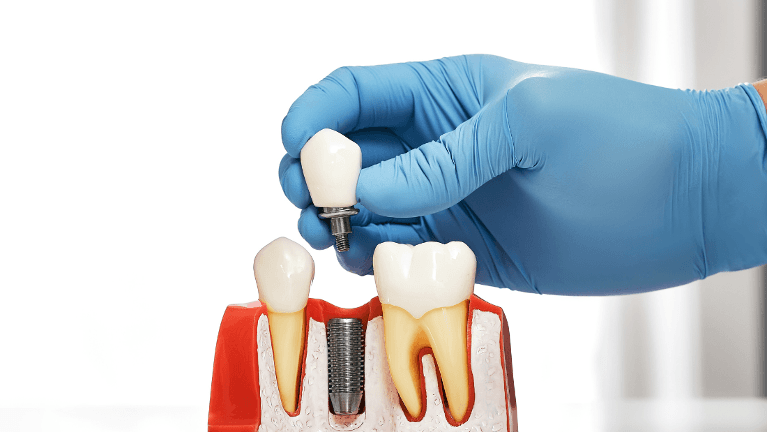
Dental implants offer a permanent solution for missing teeth and look, feel, and function like natural teeth. Despite their growing popularity, many misconceptions still deter potential patients from this life-changing treatment. This blog discusses the most common myths about dental implants and provides accurate information so you can make an informed decision about your dental care.
Dental Implant Misconceptions
Many people with missing teeth are aware of dental implants but choose to avoid the treatment due to fears based on inaccurate information. Implants are an incredible option, so let’s debunk the most common myths so you can make the best choice for your health.
Misconception One: Dental Implants Are Extremely Painful
One of the most prevalent fears about dental implants is that the procedure is excruciating. In reality, patients typically only experience the discomfort of holding their mouths open for an extended period and the sounds made by dental tools during the procedure.
You shouldn’t feel any pain with local anesthetic, so if you do, alert your dentist immediately, as you may require more anesthetic. Many patients compare the experience to having a tooth extracted or a root canal, which can be unpleasant but should never be painful.
There may be some pain during recovery, but there are several ways to manage discomfort, such as over-the-counter painkillers, ice packs, and eating soft, cold food like ice cream. Any pain should pass within a few days, and swelling should go down within two weeks.
Misconception Two: Implants Are Too Expensive
While implants require an upfront investment that is typically more expensive than alternative treatment options, they are significantly more cost-effective in the long term. Unlike dentures or bridges that require replacement every 5-10 years, dental implants can last a lifetime, with only the caps requiring occasional replacement every 15 years.
Once you have implants, it is improbable that the posts will require replacement, meaning less money will be spent on dental work over time. Furthermore, many dentists offer a range of financing options. At Dr. Nargiz Zadeh’s practice, we accept dental insurance and CareCredit with six-month financing options. We also offer a membership plan that provides numerous benefits to make dental care more affordable.
Misconception Three: The Recovery Process Is Long and Difficult
Another common myth is that recovering from dental implant surgery is an extended, arduous process, but in truth, you can return to your normal activities soon after the procedure. The initial healing process, in which the implants fuse with the jawbone (known as osseointegration), takes 3-6 months. However, this doesn’t mean you’ll be unable to function during this time.
Most patients can return to work within a few days, as osseointegration should occur without you being aware of it. Your dentist will provide specific post-operative instructions to ensure a smooth recovery, such as:
- Eating soft foods for the first few days
- Avoiding strenuous physical activity for a short period
- Maintaining excellent oral hygiene habits
Misconception Four: Implants Look Unnatural
One of the most significant advantages of dental implants is their natural appearance. Modern implants are custom-made to blend seamlessly with your existing teeth in color and shape, making them virtually indistinguishable from natural teeth.
The visible part of the implant, the crown, is carefully manufactured to match the opposite tooth and match the exact dimensions and unique color of the surrounding teeth. Materials like porcelain can be used to create crowns as they mimic many of the properties of natural teeth.
With dental implants, there is no risk of movement, and they don’t require any adhesives. Once they are in place and osseointegration is complete, you may even forget which teeth are replacements because they will blend in so well.
Misconception Five: Implants Are Only for Older People
While many older adults benefit from implants, they are not reserved for seniors. Dental implants are excellent options for adults of any age who have lost teeth to injury, decay, or disease.
In fact, younger patients are often ideal candidates for implants because they have better bone density and typically heal much faster. Getting implants while you are young can also prevent the long-term effects of missing teeth, such as bone loss and shifting teeth.
The main requirements for dental implants are overall good health and sufficient bone density to support them. Your dentist will assess your dental health to determine if implants are appropriate for you, regardless of age.
Dental Implants Demystified
Now that you have a clearer understanding of dental implants, you can make the best choice for your oral health undeterred by myths. Remember that each patient’s situation is unique, and the best way to determine if dental implants are for you is to visit your dentist.
Contact Dr. Nargiz Zadeh to arrange a consultation so we can confirm your eligibility for dental implants. Don’t let misconceptions hold you back from a treatment that can significantly improve your quality of life.